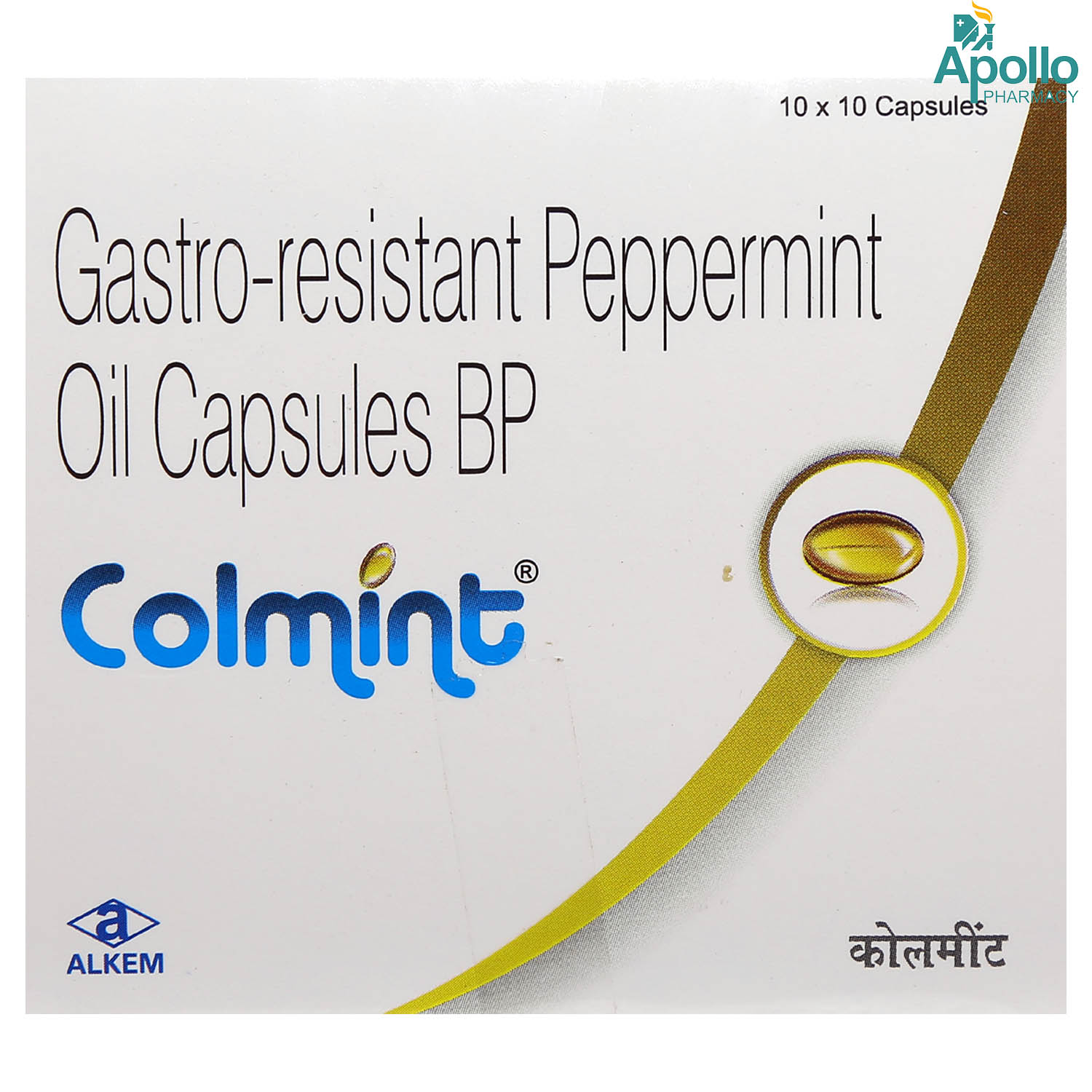Peppermint Oil
About Peppermint Oil
Peppermint Oil belongs to the class of 'antimicrobial agents,' primarily used to treat irritable bowel syndrome (IBS), indigestion, and heartburn. Irritable bowel syndrome is an intestinal disorder which causes stomach pain, wind, constipation, and diarrhoea.
Peppermint Oil contains peppermint oil, an essential oil extracted from peppermint leaves. It is an antispasmodic agent that prevents spasms in the gastrointestinal tract. It also promotes the bile flow and relaxes the muscles of the gastrointestinal tract, thus easing the symptoms of reflux.
Your doctor will advise the appropriate dose that suits your medical condition. Although peppermint oil is generally well-tolerated, some individuals may experience common side effects, including nausea, vomiting, and dry mouth. These side effects may not occur in every patient using this medication and may vary from person to person. If the side effects persist or worsen, please consult a doctor.
Let your doctor know if you are sensitive or allergic to Peppermint Oil or any other medications. Before using Peppermint Oil, let your doctor know if you have any medical history. Peppermint Oil is not recommended for patients with the absence of hydrochloric acid in gastric secretions (a condition called achlorhydria). Pregnant and breastfeeding women should consult their doctor before using Peppermint Oil. It is not recommended for use in children unless the doctor has advised.
Uses of Peppermint Oil
• Treatment of irritable bowel syndrome (IBS): Peppermint Oil relaxes the intestinal muscles, which helps reduce stomach pain, bloating, and gas caused by IBS.
• Relief from indigestion: It soothes the digestive tract, improves digestion, and reduces discomfort caused by indigestion.
• Management of heartburn: Peppermint Oil helps ease the burning sensation in the chest by calming the digestive system.
• Reduction of stomach cramps: Acts as an antispasmodic, providing relief from cramping and spasms in the gastrointestinal tract.
• Support for functional digestive disorders: Effective in reducing symptoms related to non-specific digestive discomfort.
• Natural digestive aid: Improves gastrointestinal comfort and proper bowel function.
Medicinal Benefits
Peppermint Oil contains peppermint oil, an antispasmodic agent that prevents spasms in the gastrointestinal tract. It is a digestive aid that treats indigestion and heartburn. It also promotes the flow of bile and relaxes the muscles of the gastrointestinal tract, and thus eases the symptoms of reflux.
Directions for Use
- Peppermint Oil should be taken 30 to 60 minutes before food or as advised by your doctor.
- Follow your doctor's instructions on the dosage and timing of this medication.
- Swallow Peppermint Oil as a whole with a glass of water.
- Do not crush, break or chew it.
Storage
Side Effects of Peppermint Oil
- Nausea
- Vomiting
- Dry mouth
Drug Warnings
Let your doctor know if you are sensitive to Peppermint Oil or its components. Peppermint Oil should be used with caution and only under the doctor's supervision if you have stomach/intestinal problems like little or no stomach acid (achlorhydria). Please do not take other heartburn or reflux medications and peppermint oil products simultaneously, since it can worsen heartburn. It is recommended to maintain a gap of at least two hours between taking such medications and consuming peppermint products. Let your doctor know if you plan to become pregnant or are already pregnant and a nursing mother before using Peppermint Oil. It is not recommended for use in children unless a doctor has advised otherwise.
Drug Interactions
Drug-Drug Interaction: Peppermint Oil may interact with other medications for reflux and heartburn; therefore, please maintain a two-hour gap.
Drug-Food Interaction: Avoid fatty foods, alcohol, caffeine and other triggering foods that can worsen your IBS.
Drug-Disease Interaction: Brief your medical history to the doctor if you have any other stomach/intestinal problems and achlorhydria before using Peppermint Oil.
Drug-Drug Interactions Checker List:
Safety Advice

Alcohol
cautionIt is advised to limit alcohol intake to prevent further worsening of your digestive issues. Please consult your doctor for the same before using Peppermint Oil.

Pregnancy
cautionDuring pregnancy, use Peppermint Oil only when advised by your doctor. It is recommended to consult your doctor if you plan to conceive or are already pregnant before starting Peppermint Oil.

Breast Feeding
consult your doctorPlease consult your doctor before using Peppermint Oil if you are a nursing mother.

Driving
safePeppermint Oil usually does not affect your ability to drive or operate machines. Please seek medical advice for more information.

Liver
cautionLet your doctor know if you have any history of liver disease. Your doctor will weigh the benefits and potential risks before recommending Peppermint Oil.

Kidney
cautionLet your doctor know if you have any history of kidney disease. Your doctor will weigh the benefits and potential risks before recommending Peppermint Oil.

Children
cautionPeppermint Oil should be used in children only when advised by the doctor.
Habit Forming
Diet & Lifestyle Advise
- Avoid or limit the intake of alcohol and caffeine.
- Manage stress, eat healthily, drink plenty of water, exercise regularly, and get plenty of sleep.
- Limit taking high-fibre foods, foods, and drinks containing chocolate, alcohol, caffeine, fructose, sorbitol, carbonated beverages, fried, and fatty foods.
- Avoid having large meals at once; instead, try having small, simpler meals at regular intervals, incorporating fresh fruits and vegetables into your diet.
- Practice yoga and recreation techniques to manage your emotional stress.
- If you are lactose intolerant, avoid using dairy products as they can worsen your IBS.
- If you cannot take dairy products, it is advised to include other calcium-rich foods like leafy greens, beans, nuts, and seeds.
- Drink plenty of fluids and dress lightly to prevent heatstroke and dehydration.
- Avoid overly strenuous activities, such as intense exercises and using hot tubs.
Patients Concern
Disease/Condition Glossary
Irritable Bowel Syndrome (IBS): It is also termed as IBS colitis, mucous colitis, spastic colon, nervous colon, and spastic bowel. It is an inflammatory bowel disease that affects the large intestine. Symptoms of IBS include abdominal pain, bloating, diarrhoea, mucus in stools, wind, constipation, tiredness, anxiety, depression, heartburn, indigestion, and headaches. IBS can be controlled by managing diet, excluding certain intolerant foods, lifestyle and stress. It is more commonly found in people in their late teens to early 40s.
FAQs
Peppermint Oil is used to treat irritable bowel syndrome (IBS), indigestion, and heartburn.
Peppermint Oil consists of peppermint oil. It works by relaxing the gastrointestinal (GI) muscles and promoting bile flow, thereby relieving spasms in the stomach and intestine, heartburn, and other GI discomforts.
Use Peppermint Oil with caution and only under the doctor's supervision if you have any pre-existing medical concerns, other severe stomach and intestinal problems, and absence of hydrochloric acid in the gastric secretions (achlorhydria).
Though peppermint oil is used to treat heartburn and other digestive issues, some people may not tolerate it and may experience heartburn when the enteric coating breaks down more quickly. This breakdown usually occurs when you take peppermint oil along with other medications that treat reflux or heartburn. Hence, it is advised to maintain a gap of at least two hours between such drugs and enteric-coated peppermint products.
If you suffer from IBS, limit taking high fibre foods, foods, and drinks containing chocolate, alcohol, caffeine, fructose, sorbitol, carbonated drinks, fried, and fatty foods. Avoid large meals; instead, opt for smaller, simpler meals at regular intervals, incorporating fresh fruits and vegetables into your diet.










